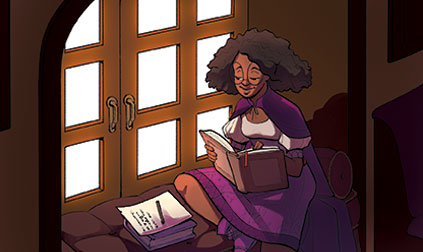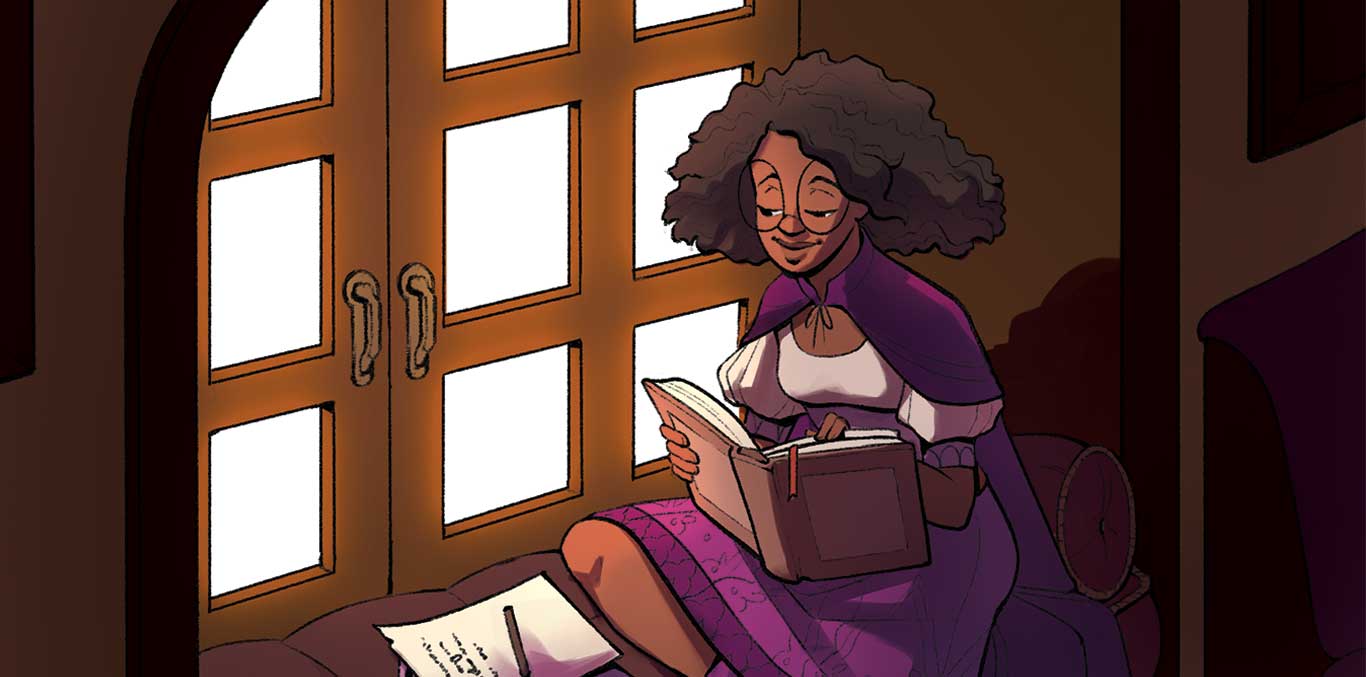Random Nonsense
- March 20, 2019
- Articles
- Posted by Geoffrey Golden
- Comments Off on Random Nonsense
For the last few years, we’ve been experiencing a roleplaying boom. Board game sales are up. New gaming cafes are opening across the country. Podcasts and streaming shows are turning RPG gamers into household names. But for all the love and attention given to tabletop gaming lately, there’s an offshoot of the genre—a redheaded, paperback-bound stepchild—that’s been unjustly forgotten during this D&D resurgence.
* * *
When I was growing up, none of my friends played D&D. We were all about our video game consoles. The Fred Savage movie / shameless Nintendo commercial The Wizard was targeted to me specifically. I was definitely a Nintendo kid, but I was also (weirdly) a story kid. I poured over game manuals looking to learn anything I could about the heroes, villains, and worlds of my favorite games. I didn’t just want to play a game, I wanted to play a story.
At a Scholastic Book Fair, I discovered something really cool: a Nintendo Adventure Book. It was similar to a Choose Your Own Adventure (CYOA), which I also enjoyed, but “leveled up” with puzzles to solve, items to collect, and Koopa Kids to foil. The book felt a lot like a game, and thus began a lifelong fascination with the adventure gamebook genre.
Adventure gamebooks are a combination of CYOAs and tabletop roleplaying games. The reader is asked to make choices, sending them one way or another on a branching narrative path. In addition, the books weave in elements from RPGs: readers create characters, learn magic spells, collect helpful items, and slay vicious monsters with dice!
For a time, gamebooks were incredibly popular. One of the first and best remembered series was Fighting Fantasy, created by Games Workshop co-founders Ian Livingstone and Steve Jackson (the British Steve Jackson, not the American Steve Jackson, creator of Munchkin. So many Steve Jacksons!). Fighting Fantasy launched in 1982, spawning 59 titles and selling 20 million copies throughout the 80s.
During the ’90s, when D&D became more of a niche hobby (eclipsed by video games and VHS tapes), the best-known adventure gamebook series was discontinued. Fighting Fantasy ceased publication in 1995 after 59 titles, followed in 1998 by its 9-million-copy-selling rival, the Lone Wolf series.
Over the years, I’ve slowly amassed a small library of gamebooks. Unlike most of my old video games cartridges, lost to moving sales and game trade-in shops, I’ve managed to hold onto these strange and wonderful books.
So with the rise in popularity of roleplaying games, I wondered if my love for adventure gamebooks was just the rose colored glasses of nostalgia, or if this art form is really worth revisiting. I decided to re-play some of my favorite adventure gamebooks from my shelf and discovered some new favorites in my research. Here’s what I found…
 Adventure gamebooks are a great way to get started with RPGs. Imagine you’ve never played a roleplaying game before in your life. (I know that might be difficult as the reader of a magazine called Rolled & Told.) Many tabletop roleplaying games are complex, with lots of rules to learn and decades worth of lore to dig into. When I try to convince RPG newbies to play a tabletop game with me, I’m often met with expressions of skepticism—or pure terror.
Adventure gamebooks are a great way to get started with RPGs. Imagine you’ve never played a roleplaying game before in your life. (I know that might be difficult as the reader of a magazine called Rolled & Told.) Many tabletop roleplaying games are complex, with lots of rules to learn and decades worth of lore to dig into. When I try to convince RPG newbies to play a tabletop game with me, I’m often met with expressions of skepticism—or pure terror.
So, as a new player, how do you know if you want to invest your time and energy into playing tabletop roleplaying games? I think adventure gamebooks would serve as an excellent gateway.
The rules pages for gamebooks in my library are typically around two to five pages long, written in plain language. In the gamebooks I’ve played, even when it’s part of a series, there’s no expectation that you already know how to play. To be “stand-alone,” the books treat each reader as a brand-new player.
Sometimes the rules are written cleverly, in a conversational style. In the cheeky opening of The Castle of Darkness by J. H. Brennan (#1 in the Grail Quest series), Merlin the wizard gives you the instructions as if you were his pupil.
“Don’t fidget!” Merlin instructs, before educating you on how to fight. “The way you fight in my Time is a bit peculiar. You have to roll dice. Two dice together, or one die twice. Doesn’t matter which. If you score more than 6 on your two rolls added together, it means you’ve hit your enemy. Landed him a whopper on the snout or wherever.”
Simple and easy-to-understand mechanics help new players get a feel for what’s fun about roleplaying games. In The Citadel of Chaos by Steve Jackson (#2 in the Fighting Fantasy series), you build a character and choose from a list of spells your character knows. At specific points in the book, the player can cast a spell to avoid danger or power-up during battle, but each spell can only be used once per game. This gives the reader the feel of using magic in an RPG game with none of the complexities.
One anxiety I’ve noticed from new players is the concern that they’re “holding back” a group of expert players by being confused or asking too many questions. The reader of a gamebook is on a solo adventure, and can focus their energy on solving puzzles, winning battles, making story decisions, and having fun! Hopefully, after playing a gamebook or two, the new player would feel more comfortable with the roleplaying format.
Explore a new game master’s imagination. What if every movie in theatres was directed by Steven Spielberg? Even if you love Spielberg, seeing every movie through his creative lens and vision would no doubt get monotonous after a while. (“Why did Mr. Spielberg put so many CG dinosaurs into La La Land?”)
But in a way, playing in a regular D&D group—where one person always assumes the role of GM—is kind of like that. In that situation, you’re always experiencing the game as filtered through the same GM’s imagination. But that begs the question: How do you get more variety in your RPG gaming? For many, committing to several different multi-hour game sessions per week (online or in-person) is not possible. Who’s got the time?!
I think adventure gamebooks can be helpful here, too. You can experience tabletop-style gaming from many different authors and enjoy fresh perspectives on the genre. Match wits with the aforementioned Steve Jackson in the bestselling Fighting Fantasy and Sorcery! series. Explore a satirical, postmodern sci-fi world created by cartoonist Zachary Weinersmith (SMBC Comics) in his Trial of the Clone books. Or play one-on-one with legendary D&D creator Gary Gygax in his Sagard the Barbarian series.
There are new gamebooks being released all the time by emerging and veteran authors! Gamebooknews.com is a terrific resource for reviews of new releases.
Variety is the spice of fantasy life. I realize I’m about to commit heresy. Fingers crossed this is a safe space to admit that I’m not that into the fantasy genre. I don’t dislike it, but I prefer stories about superheroes and space cowboys to ones about knights and wizards with very, very long beards.
In the world of tabletop roleplaying, fantasy is often considered the default. It can be tricky to find a group of players willing to take on games in niche genres (World Wide Wrestling, anyone?), like asking everyone at a party if they’re cool with anchovies on their pizza.
So while I might have a hard time putting together a group to play as my beloved X-Men in the Marvel Super Heroes RPG, I enjoyed playing as four different X-Men (Wolverine, Rogue, Nightcrawler, and Storm: Mohawk Edition) in An X-Cellent Death by Kate Novak (#7 in the Marvel Super Heroes gamebook series).
Burn rubber on post-apocalyptic roads with Mad Max style adventures in the Freeway Warrior series and Steve Jackson’s Car Wars books. (The American Steve Jackson this time! Sorry!) Solve mysteries alongside the world’s greatest detective in Sherlock Holmes Solo Mysteries. Travel through space and time in the sci-fi adventure series Falcon by Mark Smith and Jamie Thomson.
If your feet get weary trudging through mysterious forests and mountain passes, gamebooks offer lots of genre variety. (And an abundance of fantasy adventures, too.)
New ideas for Game Masters. A common piece of advice for writers is to read. The more you read other authors and see how they construct their stories and sentences, the more informed your own work will be. The same advice is given to game designers—play many games and think critically about their mechanics and world-building.
Along these lines, I think adventure gamebooks can be helpful for game masters. They can show GMs new and interesting puzzles for players, different ways to construct worlds for exploration, and a variety of ways to pace an adventure.
Seeing how different gamebook authors use the medium can be instructive. For example, I read two back-to-back issues of an 80s UK gamebook magazine called Proteus. Every issue was a playable 40-page adventure. “In Search of the Lost Land” by Ruth Pracy (issue #14) was written with florid prose, and its tricky maze requires thoughtful exploration and mapmaking. I played twice and never encountered a monster.
On the other hand, “The Shadow of Shargan” by Elizabeth Caldwell (issue #13) is quickly paced and action-packed. In the very first paragraph of the adventure, you put your laser-sword (!) up to the neck of an innkeeper and soon after you’re in a brawl with two demons.
Playing and experiencing worlds created by other game masters helps shape our personal storytelling philosophies and style. I’m more of a laser-sword guy.
* * *
Was every aspect of every gamebook I played amazing? No, of course not. Some were unfairly difficult. In The Citadel of Chaos, you determine your stats by random dice roll—a few bad rolls and you’re saddled the whole game with lousy character traits. And sometimes a completely random choice (left door or right door) leads to instant death without any warning to the player or any way to recover…besides using your fingers as bookmarks, of course.
Another issue I encountered was lack of choice or “freewill.” In An X-Cellent Death, there are some scenes that read more like a novel, not offering enough branching paths to the player in my opinion. In The Trial of the Clone, the main enemy of the first section is literally unbeatable—a funny joke, but honestly frustrating as a player.
And to be clear, I don’t think gamebooks are a substitute for roleplaying with friends. One of my favorite aspects of roleplaying is improvising in character, whereas gamebooks are a more quiet, personal experience. And I always enjoy when our party makes choices the GM doesn’t anticipate, forcing them to think on their toes. Adventure gamebooks have predetermined paths and choices, making them less flexible and interactive than playing with real life human beings.
That said, I really loved playing these gamebooks, and I’ll be seeking out more (especially ones written in this decade). They combine the absorbing effect of reading with the fun of making narrative choices and battling crazy monsters with the roll of a dice. Every gamebook I played was a memorable experience, and I understand why classic titles like Fighting Fantasy have a cult-like following online.
I highly recommend seeking out a few titles from the series I mentioned and trying them out for yourself. And be sure to read the next edition of Rolled & Told, because I’m writing a brand-new gamebook adventure for the issue. All you’ll need is a pencil and a six-sided die and you’ll be ready to “hit the books”—for adventure!
 Geoffrey Golden is a game designer and comedian in Los Angeles. He co-created Wet Hot American Summer: Fantasy Camp, an officially licensed tabletop RPG in stores now.
Geoffrey Golden is a game designer and comedian in Los Angeles. He co-created Wet Hot American Summer: Fantasy Camp, an officially licensed tabletop RPG in stores now.
Reference:
https://www.theguardian.com/books/2018/apr/04/fighting-fantasy-game-books-charlie-higson-interview
https://www.theguardian.com/technology/2016/sep/25/board-games-back-tabletop-gaming-boom-pandemic-flash-point
https://screenrant.com/dungeons-dragons-popularity-critical-role/
…
Nintendo, Nintendo Adventure Book, The Wizard, Fighting Fantasy, Lone Wolf, The Castle of Darkness, Grail Quest, The Citadel of Chaos, La La Land, Sorcery!, Trial of the Clone, Sagard the Barbarian, X-Men, Marvel Super Heroes, Wolverine, Rogue, Nightcrawler, Storm, An X-Cellent Death, Mad Max, Freeway Warrior, Car Wars, Sherlock Holmes Solo Mysteries, Falcon, Proteus, ͞In Search of the Lost Land,͟and ͞The Shadow of Shargan,͟ are the trademarks of their respective owners, which are not associated with Lion Forge.


